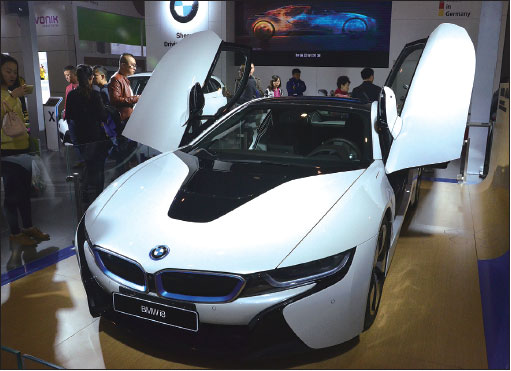Region's economic powerhouse harnesses high-tech production
Sichuan province, an economic engine in western China, is a top destination in the region for high-tech projects from home and abroad. The province attracted a number of such projects during the 16th Western China International Fair earlier this month.
Chengdu, capital of Sichuan province, signed three investment agreements with Zhejiang Geely Holding Group to strengthen cooperation in auto manufacturing.
One of the projects will be located in the Tianfu New Area, China's 11th national-level development area, which the State Council approved in October 2014. It will produce high-performance blade electric vehicles under the Volvo brand as well as domestic-brand blade electric vehicles.
The second project will bring in Volvo Scalable Product Architecture, a global full-size unibody automobile platform developed and produced by Volvo.
The third project will produce Geely's BMA vehicles, using the latest modular architecture platform jointly developed with Volvo, as well as advanced hybrid and plug-in hybrid power systems.
The three projects will have a combined annual production capacity of 600,000 units.
Geely began investing in Sichuan in 2007 by setting up a manufacturing base in Chengdu. In 2010, the company purchased Volvo, which is headquartered in Gothenburg, Sweden, and later built Volvo's first manufacturing plant on the Chinese mainland in Chengdu.
Volvo's new luxury sedan, the S60 Inscription, has been manufactured in the Chengdu plant and exported to the United States since September 2015.
Geely is also building a manufacturing base for its new energy commercial vehicles in Nanchong, Sichuan province, with a total investment of 7 billion yuan ($1.02 billion).
The company expects the Nanchong base to be completed by July 2017. It will have an annual production capacity of 100,000 vehicles and 50,000 powertrains upon completion.
Li Donghui, executive vice-president of Geely, said the three projects will further boost the development of Geely's Chengdu base. He expects the annual output value of the Chengdu base to reach 100 billion yuan after the projects are fully completed and put into use.
"We will build the Chengdu base into one of Geely's most important strategic bases for new energy vehicles designed for the markets along the Belt and Road," he said.
The auto industry is a pillar of Sichuan's economy. Last year, the province produced more than 1 million cars.
The Chengdu city government also signed a strategic cooperation agreement with a group of leading new energy carmakers to establish a new energy vehicle industry alliance.
The Chengdu New Energy Vehicle Industry Alliance aims to establish a cooperation platform for the whole industrial chain of Chengdu's new energy auto sector, helping to make the city a manufacturing hub for new energy vehicles with international competitiveness.
Germany-based Siemens AG signed an agreement worth 1 billion yuan with BOE Technology Group Co Ltd's Chengdu subsidiary to help the latter upgrade its production line. According to the agreement, Siemens will transform BOE's production line in Chengdu according to the German Industry 4.0 strategy's standards.
During the Western China International Fair held in 2011, Siemens signed an investment agreement with the Chengdu Hi-tech Industrial Development Zone to establish the company's first modern digital factory in China.
Siemens announced in July that it would increase its presence in Chengdu, by setting up an independent legal corporation with registered capital of 330 million yuan to operate its current Chengdu factory.
"As it turns out, choosing Chengdu was a wise decision," said Roland Busch, a member of Siemens' managing board, during this year's Western China International Fair.
He said the Chengdu factory is a model for Siemens' digital factories and a representative project of Germany's Industry 4.0 strategy.
The province's aviation industry also drew cooperation projects during the fair. Beichuan Qiang autonomus county signed an agreement with Tianjin Huake General Aviation Co Ltd, to construct a general aviation industrial project, with total investment of 360 million yuan.
Deyang city signed a memorandum of understanding with the Sino-Czech Aviation and Aerospace Association to hold an international aviation and aerospace exhibition at Deyang Guanghan Airport in 2017.
The province currently has 10 general aviation companies and eight general aviation airports. It plans to have more than 80 general aviation airports by 2030.
Sichuan has a solid foundation for the aviation and aerospace industries. One of China's major aerospace centers, Chengdu has rich experience in the research and development of national key aircraft including the F-7, FC-1/JF-17, F-10 jets and some unmanned aerial vehicles.
China's first domestically designed large passenger jetliner, the Comac C919, is equipped with many components and parts made in Chengdu, including its nose, in-flight entertainment system and communication and navigation systems.
|
BMW AG's i8 plug-in sports car is displayed at the fair.Peng Chao / For China Daily |



















